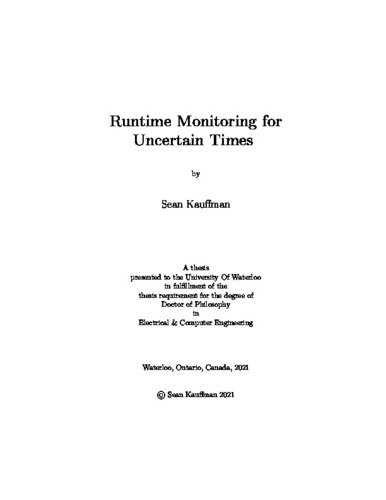| dc.contributor.author | Kauffman, Sean | |
| dc.date.accessioned | 2021-03-19 19:34:37 (GMT) | |
| dc.date.available | 2021-03-19 19:34:37 (GMT) | |
| dc.date.issued | 2021-03-19 | |
| dc.date.submitted | 2021-02-26 | |
| dc.identifier.uri | http://hdl.handle.net/10012/16853 | |
| dc.description.abstract | In Runtime Verification (RV), monitors check programs for correct operation at execution time. Also called Runtime Monitoring, RV offers advantages over other approaches to program verification. Efficient monitoring is possible for programs where static checking is cost-prohibitive. Runtime monitors may test for execution faults like hardware failure, as well as logical faults. Unlike simple log checking, monitors are typically constructed using formal languages and methods that precisely define expectations and guarantees. Despite the advantages of RV, however, adoption remains low.
Applying Runtime Monitoring techniques to real systems requires addressing practical concerns that have garnered little attention from researchers. System operators need monitors that provide immediate diagnostic information before and after failures, that are simple to operate over distributed systems, and that remain reliable when communication is not. These challenges are solvable, and solving them is a necessary step towards widespread RV deployment.
This thesis provides solutions to these and other barriers to practical Runtime Monitoring. We address the need for reporting diagnostic information from monitored programs with nfer, a language and system for event stream abstraction. Nfer supports the automatic extraction of the structure of real-time software and includes integrations with popular programming languages. We also provide for the operation of nfer and other monitoring tools over distributed systems with Palisade, a framework built for low-latency detection of embedded system anomalies. Finally, we supply a method to ensure program properties may be monitored despite unreliable communication channels. We classify monitorable properties over general unreliable conditions and define an algorithm for when more specific conditions are known. | en |
| dc.language.iso | en | en |
| dc.publisher | University of Waterloo | en |
| dc.subject | runtime verification | en |
| dc.subject | runtime monitoring | en |
| dc.subject | formal methods | en |
| dc.subject | embedded software | en |
| dc.subject | safety-critical computing | en |
| dc.title | Runtime Monitoring for Uncertain Times | en |
| dc.type | Doctoral Thesis | en |
| dc.pending | false | |
| uws-etd.degree.department | Electrical and Computer Engineering | en |
| uws-etd.degree.discipline | Electrical and Computer Engineering | en |
| uws-etd.degree.grantor | University of Waterloo | en |
| uws-etd.degree | Doctor of Philosophy | en |
| uws-etd.embargo.terms | 0 | en |
| uws.contributor.advisor | Fischmeister, Sebastian | |
| uws.contributor.affiliation1 | Faculty of Engineering | en |
| uws.published.city | Waterloo | en |
| uws.published.country | Canada | en |
| uws.published.province | Ontario | en |
| uws.typeOfResource | Text | en |
| uws.peerReviewStatus | Unreviewed | en |
| uws.scholarLevel | Graduate | en |

